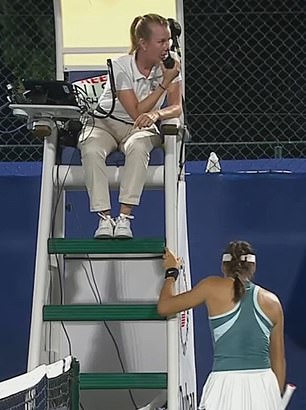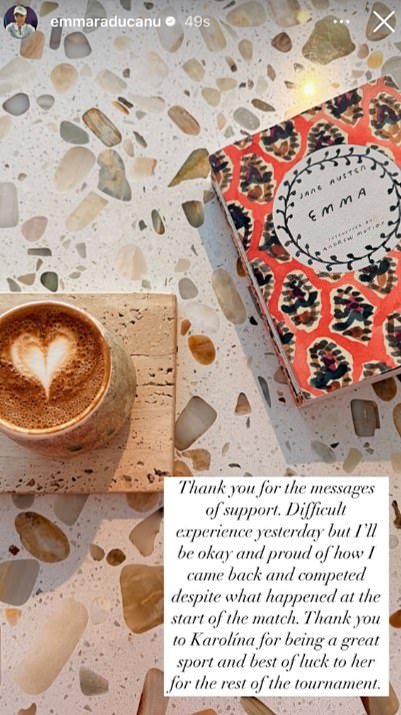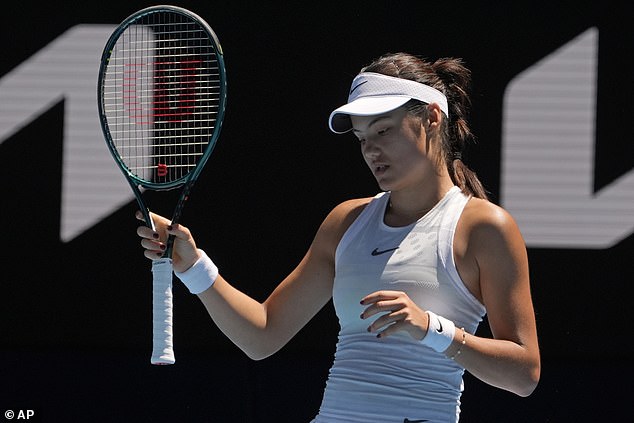After beating Maria Sakkari in Dubai on Sunday evening, Emma Raducanu talked about how much she was enjoying the city.
‘What I love most is everything is open late and I’m a big night owl, so I can go for walks at, like, 11pm,’ she said. ‘I don’t know if that’s smart or not!’
It was a throwaway comment delivered with a smile and a laugh – but the idea of 22-year-old Raducanu walking the streets of Dubai after nightfall took on a chilling aspect as events played out over the next few days.
On Monday, Raducanu was approached by a man at her hotel and handed a letter. It is understood that was not the first time she had seen the individual and the incident left her spooked enough to report it to tournament security and WTA staff.
On Tuesday, after two games of her second-round match against Karolina Muchova, Raducanu saw that same man sitting in the stands, just a few rows from the front.
She broke down in tears, approached umpire Miriam Bley and after a brief conversation cowered behind the official’s chair, where she was comforted by Muchova. All the layers of Raducanu the professional athlete had been stripped away and she appeared exactly as she was: a terrified young woman.
Emma Raducanu became visibly distressed during the Dubai Open on Tuesday evening


She was targeted by a ‘fixated’ man in the stands who she had previously encountered

The incident saw Raducanu break down in tears before she bravely recovered to play on
Viewers at the time were mystified by what was going on, speculating about injury or some sort of panic attack. But a WTA statement released the next morning revealed the grim explanation.
‘On Monday Emma Raducanu was approached in a public area by a man who exhibited fixated behaviour,’ said the statement. ‘This same individual was identified in the first few rows during Emma’s match on Tuesday and subsequently ejected. He will be banned from all WTA events pending a threat assessment.’
Remarkably, once the man was removed Raducanu recovered her composure and played a solid match against a top opponent, losing 7-6, 6-4. She flew back to London yesterday and posted on Instagram: ‘Thank you for the messages of support. Difficult experience but I’ll be OK and proud of how I came back and competed despite what happened.
‘Thank you to Karolina for being a great sport.’
Within hours of the incident, Mail Sport understands the man’s name was shared with Wimbledon, who immediately placed him on a watchlist they maintain of suspect individuals.
The man’s identity has not been made public, although we understand he is not a British national, but you can be sure it has been likewise circulated to tennis organisations around the world.
A Wimbledon spokesperson said: ‘We are aware there are a number of fixated individuals who follow players around the world and we work to ensure the players are protected at all times when in the All England Club Grounds.’
The issue of stalkers and obsessive fans is endemic in women’s tennis.

Karolina Muchova consoled Raducanu and the Czech star was later praised for her support

Raducanu posted a message on social media thanking fans following her terrifying ordeal
This is not the first time Raducanu has been targeted. In 2022, delivery driver Amrit Magar was given a five-year restraining order. Magar had been skulking around Raducanu’s house and leaving her gifts. The episode left her ‘on edge’, ‘creeped out’ and ‘constantly looking over my shoulder’.
She is far from alone. World No12 Danielle Collins had people calling her friends and family; Katie Boulter’s car was followed; Coco Gauff believed someone was gaining access to her flight details and dogging her in airports and Sloane Stephens went through one ordeal so serious that the FBI became involved.
It is revealing that of the three women asked about stalking in Dubai yesterday, two had stories to tell. Iga Swiatek said: ‘We were able to avoid one incident that might have been scary when I was hosting my own event in Poland. We should always keep our eyes open.’ Miira Andreeva said: ‘When I was 14 years old, I was playing one of my first tournaments and I received a message: “Look around, because I’m going to find you and I’m going to cut your arms”.’
As individual athletes, tennis players are uniquely susceptible to stalking. Compared to a sport such as football, players are relatively available to the public, often wandering round the tournament sites and exploring the city during their downtime – as Raducanu described in Dubai.
Their schedules are usually laid out far in advance so it is not difficult to know where they will be on a given day. I was yesterday told of one former player who would routinely check into hotels under different names to throw stalkers off the scent.
Perhaps surprisingly, personal security for players is still extremely rare. Serena Williams was one of very few who, for a time, had her own bodyguard.
A modern issue is social media, whereby a player’s posts can give clues to their location. ‘Social media hasn’t helped at all,’ said one tennis insider, who has worked in the game for over 30 years. ‘Players are even naively posting where they are eating in a restaurant.
‘Players could be more smart about what they’re posting but they should also be able to enjoy their lives.’
Social media may have put additional tools into the hands of stalkers but this is far from a modern-day problem.

The issue of stalkers and obsessive fans is currently a major problem in women’s tennis

Katie Boulter revealed last year she had been followed while out with Alex de Minaur
Serena Williams and Martina Hingis had stalker cases which went to the courts. Anna Kournikova had multiple obsessed fans and Steffi Graf once had a crazed German teenager attempted suicide by slitting his wrists on her doorstep.
Former British No 1 Jo Durie overlapped with the Graf era and spoke yesterday to Mail Sport. She articulated one of the problems women face: superfans are common in tennis and most are perfectly harmless; but others are not and it is not always easy to tell the difference until it is too late.
‘It’s when the fan spills over into something more, something intrusive and scary,’ says the former world No 5. ‘For a woman it makes you feel very unsafe.
‘I had some great fans but I had a couple that were just a bit too much. They would turn up all the time and, in the end, expect you to do things for them. I got sent things through the post… it was a scary time. In the back of your mind you’re like: When are they going to turn up? What else might they do?’
Durie describes the effect such incidents can have on a young player (she was 24 at the time). ‘It’s very unpleasant,’ she said. ‘It makes you feel terrible. There can be sleepless nights.
‘It was a sensation that someone was watching what you were doing. It’s not a nice feeling.’
The tipping point for the sport was the horrifying stabbing of Monica Seles in 1993 in Hamburg, by a crazed Graf fan.
That tragedy dramatically shifted the way in which tournaments operate, especially at the Grand Slam level. Police and security presence used to be minimal, especially on court. Remarkably, at Wimbledon fans used to wander on to the grass after a match to ask for autographs.
Tournaments now have hundreds of security staff, both visible and more discreet, such as those located directly behind where players sit at changeovers. Players are escorted to practice and match courts and at Wimbledon there is even a labyrinth of subterranean tunnels which they can use to traverse the venue.

Iga Swiatek gave a terrifying insight into the problems women’s stars face with stalkers

The tipping point for the sport was the horrifying stabbing of Monica Seles in 1993 in Hamburg

The WTA and Wimbledon both work with a company called Theseus Fixated Risk Management, experts on identifying and dealing with obsessive individuals.
When it comes to stalkers, Wimbledon feel their ticketing system gives them a layer of protection, because tickets are allotted in the ballot months in advance. In a smaller event such as Dubai, where courts rarely if ever sell out, an obsessive fan would be able to wait until the day before when the order of play is revealed and then buy a ticket for the court on which the targeted player is competing.
Such measures will hopefully be of some comfort to Raducanu and her many peers who suffer similar incidents.
But the way in which Raducanu recovered to post a decent performance, as well as showing her mental fortitude, also gave the depressing sense that this was all just another day at the office.
Source link : http://www.bing.com/news/apiclick.aspx?ref=FexRss&aid=&tid=67b657f6d5df4af79c451045be8efa30&url=https%3A%2F%2Fwww.dailymail.co.uk%2Fsport%2Ftennis%2Farticle-14414723%2Fwomens-tennis-problem-stalkers-Emma-Raducanu-ordeal-Dubai-Open.html&c=16425139781195414196&mkt=de-de
Author :
Publish date : 2025-02-19 13:00:00
Copyright for syndicated content belongs to the linked Source.















































